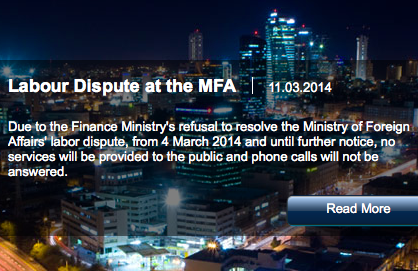The employees of Israel’s Ministry of Foreign Affairs declared an open-ended strike earlier this week, leaving Israel without foreign representation and consular services at a crucial time. While anti-Israel activists rally for boycotts, and world powers continue negotiating with Iran over the future of its nuclear program, Israel’s diplomatic corps is squabbling with the Ministry of Finance over levels of pay to diplomatic staff abroad.
The workers’ union boasted: “The workers entirely locked the Foreign Ministry and Israeli embassies in the world, for the first time in Israel’s history.” In response, Minister of Finance Yair Lapid warned that in doing so, workers were breaking the law. Foreign Minister Avigdor Liberman was harshly critical of his department’s striking employees on Tuesday, accusing them of violence and intimidation, the Times of Israel reports.
Strikes are a common feature of life in Israel, frequently snarling traffic, public services and even checkout counters in stores. Despite the prominent roles played by the military, the entrepreneurial community, and religious leaders in public life–all of which might tend towards conservative politics–the country retains an ambitious welfare state and a socialistic culture in which debate often takes the form of demands from the state.
Debates have raged online and in social media, with supporters of the striking workers often complaining about the relatively large salaries earned by staff in the Ministry of Finance. Ambassador Arthur Lenk, who represents Israel in South Africa, made a similar point recently in an op-ed attacking “the young men and women who control Israel’s ministry of finance.” Meanwhile, Israelis needing consular services abroad are out of luck.

COMMENTS
Please let us know if you're having issues with commenting.